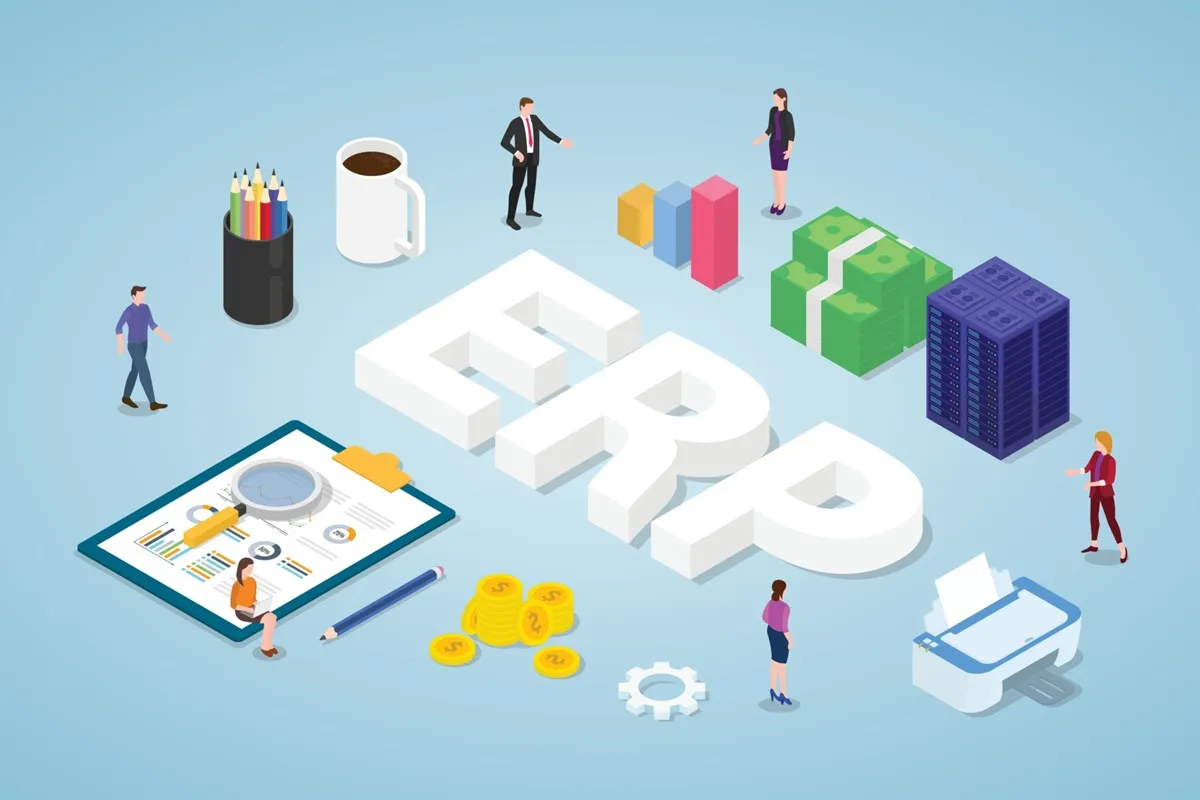Enterprise Resource Planning (ERP) systems are powerful tools that integrate various business processes into a single, unified system. They streamline operations, improve efficiency, and provide real-time data for better decision-making.
Today’s fast-paced business environment, ERP systems are essential for staying competitive and agile. This blog will explore ERP in detail, covering its history, components, benefits, challenges, trends, and more.
Historical Background of ERP
ERP systems have evolved significantly since their inception. Originally, businesses used standalone software for different functions like accounting and inventory.
In the 1960s, Material Requirements Planning (MRP) systems emerged to manage manufacturing processes. By the 0s, ERP systems began integrating various functions into a single platform.
This evolution marked the transition from traditional, isolated systems to modern, interconnected ERP solutions.
Core Components of ERP Systems
ERP systems consist of several core components, each serving a specific business function:
Financial Management
Tracks financial transactions, manages budgets, and generates financial reports. It ensures accurate accounting and helps in strategic financial planning.
Human Resource Management
Handles employee information, payroll, recruitment, and performance management. It streamlines HR processes and enhances employee management.
Supply Chain Management
Manages the flow of goods and services from suppliers to customers. It includes procurement, inventory management, and order fulfillment.
Customer Relationship Management
Tracks customer interactions, sales, and support activities. It helps businesses build strong customer relationships and improve sales strategies.
Inventory and Order Management
Monitors stock levels, manages orders, and tracks shipments. It ensures optimal inventory levels and efficient order processing.
Manufacturing and Production Planning
Schedules production runs, monitors equipment, and manages production workflows. It improves manufacturing efficiency and reduces downtime.
Benefits of Implementing ERP Systems
Implementing an ERP system offers numerous benefits:
Improved Efficiency and Productivity
ERP systems automate repetitive tasks, reducing manual effort and errors.
This leads to higher productivity and efficiency. According to Panorama Consulting’s 2023 ERP Report, 95% of businesses experienced significant improvements in their processes after implementing ERP systems.
Enhanced Decision Making
Real-time data and analytics provide insights for informed decision-making.
Businesses can respond quickly to market changes and opportunities. A study by Aberdeen Group found that organizations with ERP systems improved their decision-making capabilities by 36%.
How Partnering with an IT Company Can Drive Innovation in Your Business
Better Data Accuracy and Consistency
Centralized data storage ensures consistency and accuracy across the organization. This eliminates data silos and improves data integrity.
Streamlined Processes and Workflows
ERP systems integrate various business processes, creating streamlined workflows. This reduces delays and enhances operational efficiency.
Cost Savings and ROI
ERP systems reduce operational costs by improving resource management. The initial investment often yields a high return on investment through long-term savings.
For instance, the Panorama Consulting report found that businesses achieved an average of 22% reduction in operational costs within the first year of ERP implementation.
Challenges and Considerations
Implementing an ERP system is not without challenges:
Common Challenges in ERP Implementation
High costs, complex integration, and resistance to change are common obstacles. Businesses must plan carefully to address these issues. Gartner reports that 55% of ERP implementations exceed their budgets due to unforeseen complexities.
Factors to Consider Before Implementing ERP
Assess your business needs, budget, and technical capabilities. Choose an ERP system that aligns with your specific requirements.
Change Management and Employee Training
Effective change management strategies and comprehensive training programs are crucial. They ensure smooth transitions and user adoption.
According to Prosci, organizations with excellent change management are six times more likely to achieve their objectives.
Data Migration and System Integration
Migrating data from legacy systems to the new ERP system can be complex. Ensure data quality and compatibility for a seamless integration.
ERP Deployment Options
ERP systems can be deployed in various ways:
On-Premise ERP
Installed locally on a company’s servers. Offers control and customization but requires significant upfront investment and maintenance.
Cloud-Based ERP
Hosted on the vendor’s servers and accessed via the internet.
Provides flexibility, scalability, and lower upfront costs. According to Flexera’s 2024 State of the Cloud Report, 92% of enterprises now have a multi-cloud strategy.
Hybrid ERP Solutions
Combines on-premise and cloud-based features. Offers a balance of control, flexibility, and cost-effectiveness.
Key Trends in ERP (2024 and Beyond)
Stay updated with the latest ERP trends:
AI and Machine Learning Integration
AI and machine learning enhance ERP systems by providing advanced analytics, automation, and predictive capabilities. Forbes predicts that AI will drive a 14% increase in global GDP by 2030, significantly impacting ERP systems.
Increased Focus on Cybersecurity
With growing cyber threats, ERP systems prioritize robust security measures to protect sensitive data. The Cybersecurity Ventures report estimates cybercrime will cost the world $10.5 trillion annually by 2025.
Mobile ERP Solutions
Mobile access to ERP systems enables on-the-go decision-making and increases workforce mobility. According to Statista, the number of mobile device users is expected to reach 7.49 billion by 2025.
Industry-Specific ERP Solutions
Tailored ERP systems cater to specific industry needs, offering specialized functionalities.
Integration with IoT and Big Data Analytics
IoT and big data integration provide valuable insights and improve operational efficiency. McKinsey reports that IoT applications could generate $11.1 trillion in economic value by 2025.
Choosing the Right ERP System
Choosing the right ERP system is a critical decision for any business. It requires careful consideration of various factors to ensure the system meets your current needs and can scale with your future growth. Here’s a detailed guide to help you make the right choice.
Assessing Business Needs
Start by understanding your business processes and identifying the areas that need improvement. Determine the specific functionalities and features you require from an ERP system, such as financial management, inventory control, customer relationship management, and more.
List out the pain points in your current processes. These might include inefficiencies, data silos, lack of real-time information, or manual errors. An ERP system should address these issues effectively.
Evaluating ERP Vendors
Research potential ERP vendors. Look for vendors with a strong reputation and extensive experience in your industry. Check customer reviews, case studies, and references to assess their track record.
Evaluate the level of support and training the vendor provides. A good vendor should offer comprehensive training programs, ongoing support, and a dedicated account manager to assist you throughout the implementation and beyond.
Ensure the ERP system can be customized to meet your specific needs. It should also integrate seamlessly with your existing software and systems, such as CRM, HRM, and supply chain management tools.
Key Features to Look For
Choose an ERP system that can scale with your business growth. It should handle increased data volumes, more users, and expanded functionalities without compromising performance.
The system should be easy to use and navigate. A user-friendly interface reduces the learning curve and increases user adoption.
Ensure the ERP system provides real-time data access and robust analytics capabilities. This allows for informed decision-making and quick responses to market changes.
Security is paramount. The ERP system should offer robust security features, including data encryption, user access controls, and regular security updates to protect sensitive business information.
Cost and Budget Considerations
Consider the initial costs of purchasing and implementing the ERP system. This includes software licensing, hardware, and consulting fees.
Factor in ongoing costs such as maintenance, support, training, and potential customization. Compare these costs with the expected benefits and return on investment (ROI).
Calculate the TCO over the system’s lifespan. A lower initial cost may not always be the most cost-effective option in the long run if it leads to higher maintenance and upgrade costs.
Future Scalability and Flexibility
Choose an ERP system that can adapt to changing business needs and industry trends. It should offer flexible modules and features that can be added or modified as required.
Ensure the vendor provides regular updates and enhancements to keep the system current with technological advancements and regulatory changes.
A strong user community and vendor support network can be invaluable for troubleshooting, sharing best practices, and accessing new features.
The Future of ERP
The future of ERP systems is shaped by emerging technologies and evolving business needs. Staying ahead of these trends can help businesses maximize their ERP investments and drive long-term success.
Predictions and Forecasts for ERP Evolution
Cloud-based ERP systems will continue to dominate, offering scalability, flexibility, and cost-effectiveness. Gartner predicts that by 2025, 85% of new ERP implementations will be cloud-based.
AI and machine learning will play a significant role in ERP systems, automating routine tasks, providing predictive analytics, and enhancing decision-making.
The Internet of Things (IoT) will integrate with ERP systems to provide real-time data from connected devices. This will improve asset management, predictive maintenance, and overall operational efficiency.
Blockchain technology will enhance transparency and security in ERP systems, especially in supply chain management. It will enable secure, tamper-proof transactions and improve traceability.
How Businesses Can Prepare for Future ERP Trends
Invest in continuous training for your employees to ensure they are proficient with the latest ERP features and best practices. This will maximize the system’s effectiveness and ROI.
Choose an ERP system that offers flexibility and modularity. This allows you to add new functionalities and adapt to changing business needs without significant disruptions.
Implement robust security measures to protect against cyber threats. Ensure your ERP system is regularly updated with the latest security patches and protocols.
Foster collaboration between IT and business departments to ensure the ERP system aligns with overall business strategies and objectives.
Role of Emerging Technologies in Shaping ERP Systems
AI and machine learning will transform ERP systems by providing advanced analytics, automation, and decision-making support.
IoT integration will enable ERP systems to collect real-time data from connected devices, improving asset management, inventory tracking, and operational efficiency.
Blockchain and AI Integration: Future Trends and Development Challenges
Blockchain will enhance security, transparency, and traceability in ERP systems, particularly in supply chain management. It will enable secure, tamper-proof transactions and improve data integrity.
Big data analytics will allow ERP systems to process and analyze vast amounts of data, providing deeper insights into business operations and market trends.
Cloud computing will continue to drive the evolution of ERP systems. It will enable businesses to access ERP functionalities from anywhere, ensuring continuous productivity.
Conclusion
ERP systems are vital for modern businesses, offering numerous benefits from improved efficiency to cost savings. Understanding the core components, challenges, and trends in ERP can help businesses choose the right system and implement it successfully.
As ERP technology evolves, staying informed and adaptable will ensure your business continues to thrive.



